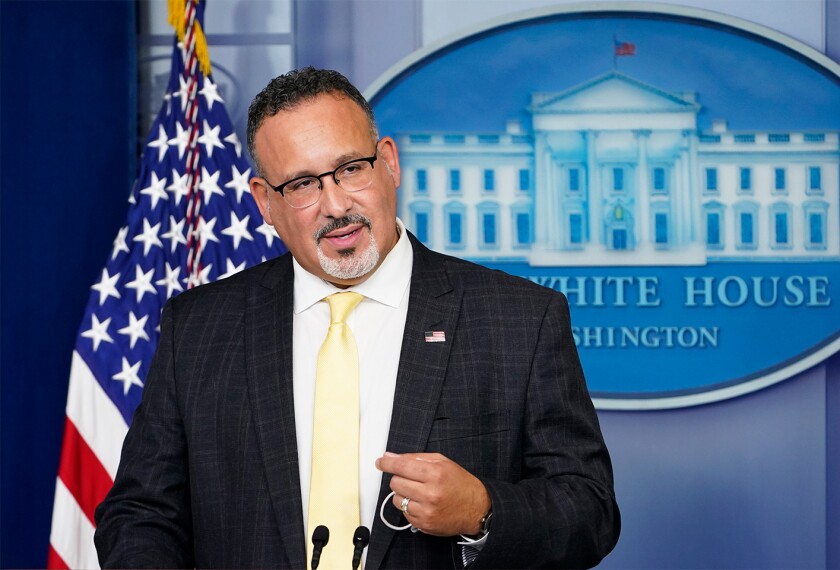The Biden administration’s priorities for education grants will include promoting equity in resources and opportunities, addressing learning loss caused by the pandemic, and advancing “systemic change” in schools.
These priorities, named in a Federal Register notice Dec. 10, involve U.S. Secretary of Education Miguel Cardona’s top issues for grants that Cardona and his department award at their discretion for both K-12 and higher education.
Beyond that, they represent the Biden administration’s overarching philosophy for the most important issues facing schools.
The six priorities don’t apply to federal money that goes out to states and school districts through formulas set by Congress, such as Title I aid for disadvantaged students. And they cover a very small portion of the Education Department’s overall budget. Yet they will serve as a lens through which federal officials will judge hundreds of millions of dollars in grants to schools for a variety of projects.
In a related move, the department simultaneously announced a new grant competition to bolster efforts to help students and schools recover from the pandemic. The grants will be overseen by the Institute for Education Sciences, and will fund “research recovery network” for pre-K, K-12, and community colleges.
In June, the department released a draft version of the discretionary grant priorities for public comment. Those top issues didn’t change in the final version, but the department did tweak some details about them after getting feedback from educators and others.
Some told the department that its use of the term “educator” in its draft lacked clarity about who the term referred to. In response, the department added a definition for the term that includes “early childhood educators, teachers, principals and other school leaders, specialized instructional support personnel (e.g., school psychologists, counselors, school social workers), paraprofessionals, and faculty.”
And for the priority for grants to address COVID-19’s affects, the agency added a focus on “underserved students.”
The priorities detail ways grants can be used to further the Biden administrations’ top issues for schools, and such strategies can vary widely.
For example, the department’s priority dealing with K-12 workforce would apply to projects focused on “increasing the number of diverse educator candidates who have access to an evidence-based comprehensive educator preparation program,” or those that address “implementing or expanding loan forgiveness or service-scholarship programs for educators based on completing service obligation requirements.”
During the Trump administration, former education Secretary Betsy DeVos’ priorities for federal grants included school choice and STEM.
Here are the official discretionary grants priorities released Friday:
- “Addressing the Impact of COVID–19 on Students, Educators, and Faculty”
- “Promoting Equity in Student Access to Educational Resources and Opportunities
- “Supporting a Diverse Educator Workforce and Professional Growth To Strengthen Student Learning”
- “Meeting Student Social, Emotional, and Academic Needs”
- “Increasing Postsecondary Education Access, Affordability, Completion, and Post-Enrollment Success”
- “Strengthening Cross-Agency Coordination and Community Engagement To Advance Systemic Change”









